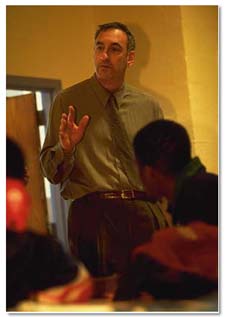
Main Menu ·
Search ·
Current Issue · Contact · Archives · Centennial · Letters to the Editor · FAQs
Profiles
Back to Promoting a National Love of Children
 |
Photograph by David Zadig
|
Charles Deutsch, a senior program associate at HPSC and instructor at the
School of Public Health, considers health part of the broader issue of community.
"Like learning, health is an active and intensely social process, with
mental, emotional, and moral dimensions, all strongly infiuenced by
environment," he says. "The message I give when I talk to parents
is always that, whatever you do for your kids at home, they are part of
a larger community of other parents and kids. And when you talk about kids'
health, it's not primarily physical, it's also mental, emotional, moral,
and social. It has to do with building community around kids."
Deutsch began his professional life as a teacher, but "teaching exhausted
me," he confesses. "I marvel at the people who can do it."
After two years he enrolled at Yale for a master's degree in teaching, then
became a welfare-rights organizer, and earned a doctorate in behavioral
sciences at Harvard's School of Public Health. In the 1970s he devised an
alcohol-education program for teenagers that was nationally replicated,
and in the 1980s he helped develop the first comprehensive secondary-school
health curriculum found by the Centers for Disease Control to be effective
in infiuencing students' knowledge, attitudes, and practices about
health. That curriculum is currently in use in the Cambridge and Boston
schools.
"The way I see my role," he says, "is to try to make health
more important to the people whose mission it is to try to educate kids.
I see Harvard's role as providing high-visibility institutional leadership
on these issues."
In pursuit of those roles, Deutsch is determined that "practitioners
keep us real all the time." Refiecting on the contradictions inherent
in American attitudes toward children, he talks of "the tensions between
a family's right to impair their kid, the kid's right to get help and intervention,
and the public good. Kids are not private property. Parents who have alcohol
and drug problems or have themselves been victims of abuse do not damage
only their own children but all children. If we want to do better for all
children, we in academia have to be more involved."
Back to Promoting a National Love of Children
Main Menu ·
Search · Current Issue · Contact · Archives · Centennial · Letters to the Editor · FAQs

![]()

![]()